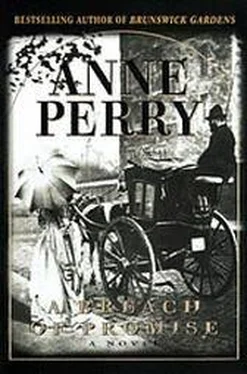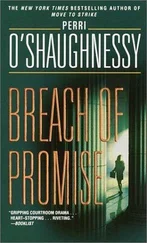The judge looked expectantly at Rathbone.
Rathbone had turned immediately to Melville. Sacheverall was right in that he had not known his client as well as he wished to.
But the look on Melville's face was one of bitter but quite honest laughter. No one could doubt he found the remark genuinely funny. There was no embarrassment in him, not a shred of shame or even discomfort.
The judge blinked.
One or two jurors looked at each other.
Sacheverall colored very slightly, as if aware he had stepped a little too far. For the first time he had lost the sympathy of the jury. But he would not retreat.
"There may be many reasons for a man to shrink from marriage," he said rather loudly. "Reasons he would not be willing to acknowledge to anyone. I make no accusations, please be clear, I speak only in general. He may be aware of disease in himself, or in his family." He waved his arms in a gesture Rathbone had come to recognize was characteristic. "There may be a strain of madness. He may have a burden of debt he cannot meet, and therefore could not keep a wife. He may even be in danger of prosecution for some offense or other. He may already be married!"
There was a buzz of excited conversation as people in the gallery turned to whisper to one another.
"Silence!" Mr. Justice McKeever ordered, his voice surprisingly penetrating for one so soft "Silence, or I shall clear the court!"
Obedience was instant. A man in the gallery cleared his throat, and it sounded like a minor explosion.
"Or he may be unable to consummate the union," Sachev-erall finished.
One of the jurors, an elderly man with thick white hair, clicked his teeth and shook his head disapprovingly. The remark obviously offended him as being in exceedingly poor taste. Gentlemen did not discuss such things.
Again Rathbone glanced at Melville, and saw only laughter in his light, sea-blue eyes.
"Of course," Rathbone agreed, equally penetratingly. "And there may be many reasons why a man may decline to marry a particular lady, many of them disagreeable, coarse and offensive even to suggest, so I shall not." He saw out of the corner of his eye one of the jurors nod. "I am loathe to have this already sad situation descend to such a level," he finished.
McKeever smiled bleakly. He had seen too many civil cases to hold out any such hope.
"I am sure you would," Sacheverall agreed sarcastically. "And I daresay your client even more so. But he should have thought of that before he humiliated and insulted Miss Lambert and used her affections so lightly. It is too late for such regrets now, even more for the fear of how it may reflect upon his own reputation."
The fragile advantage had slipped away already. Thank heaven it was Friday and Rathbone had two days in which to try to prevail on Melville to tell him the truth. If he did not, then he could see no strategy at all which would avoid defeat. Perhaps Melville had not realized quite how damaging that would be to him, not only financially but also professionally. Barton Lambert would certainly cease to support him or employ him. Lambert was a man of influence. Melville might very well find his entire career jeopardized, regardless of his brilliance.
Rathbone forced himself to smile and face Sacheverall.
"This is not over yet," he said with infinitely more confidence than he felt. "Let us await the conclusion before we assess the damage, and to whom. I have no wish to cause injury, but I shall represent my client's interests with all the vigor at my disposal."
"Naturally." Sacheverall was not disturbed. He had regained his composure and he knew he had little to fear. Victory was only an inch from his grasp, and in his mind he could already feel it. "One would expect no less of you," he added, but his smile lacked any anxiety that Rathbone might win.
He called one more witness, and then the court was adjourned for the weekend. The crowd dispersed from the gallery with unusual quietness and good order. It was an ominous sign. They were not expecting any surprises, no turn in events to spark their interest or change what to many was already a foregone conclusion.
Melville rose to leave also and Rathbone put his hand out and grasped his arm, gripping it unintentionally hard. He saw Melville wince.
"You're not going," he said grimly, "until you tell me the truth. I don't think you realize just what you're facing. This could ruin you."
Melville sat down again, turning to stare at him. Around them the crowd had moved away. There was hardly anyone left except the ushers and court officials.
"You need a lot more than talent to succeed in the arts," Rathbone went on quietly but clearly. "You need patronage, in architecture more than almost anything else. Your plans are stillborn if they never get off the paper." He saw the pain tighten Melville's face but he had to go on. If he did not succeed in persuading him now it could be too late. "You have to have a wealthy patron who believes in you and is willing to spend tens of thousands of pounds to build your halls and houses and theaters. You are not big enough yet to defy society, and you will very soon find that out if you lose this case without any excuse to offer."
Melville blushed. "You want me to try to blacken her name?" he asked angrily. "Suggest that I suddenly found out something about her so appalling I couldn't live with it? That she was a thief? A loose woman? A drunkard? A spendthrift? A gambler? I can't. And if I could"-his lip curled in disgust- "would that endear me to society, do you suppose? How many wealthy men would then wish to have me in their close acquaintance, to observe their wives and daughters and then tell the world their weaknesses!"
"I don't want you to tell the world!" Rathbone answered back with equal sharpness, and still holding Melville's wrist, ignoring the last few people leaving the room, looking at the lawyer and his client curiously. "I meant you to tell me so I can understand the battle I am supposed to be fighting. I don't need you to tell me that blackening Zillah Lambert's name, with or without justification, will not help you. But with the truth, I may be able to reach a settlement out of court. It wouldn't be victory, but it would be a great deal better than any other alternative facing you now."
"I know nothing to her detriment," Melville insisted. "Do you think I am being noble and letting her family sue me without a word in my defense? Is that what you imagine?" There seemed to be a brittle ring of amusement in him, as if the idea were funny.
"I don't know what to think." Rathbone half turned as the last woman went out of the doors and the usher looked at him enquiringly. "But if there is nothing about Zillah, then I must conclude that Sacheverall is right and it is something to do with you."
He had longed to read an answer, a vulnerability or a fear in Melville's eyes which would give him the clue he needed, but there was nothing. Melville remained staring at him with a blank, defiant despair.
"Is there someone else you love?" Rathbone guessed. "It doesn't excuse you, but it would at least explain-to me, if no one else."
"There is no one else I wish to marry," Melville replied. "I have already told you that." He gave a little shiver. "There is no purpose in your asking me, Sir Oliver. I have nothing to tell you which can help. The only truth of the matter is that I never asked Zillah to marry me. I have no intention of ever marrying anyone." There was a curious bleakness in his eyes as he said it, and a momentary pull at his lips. "It was arranged without consulting me and I was foolish enough not to realize that all the chatter was taken to be sufficient notification. I was blind, I fully acknowledge that; naive, if you like." His chin came up. "I admit to carelessness of her feelings because I did not think of her as more than a friend I cared for dearly. It did not cross my mind that she felt otherwise. That was clumsy, looking back with the clarity of hindsight. I will not make that error again."
Читать дальше











